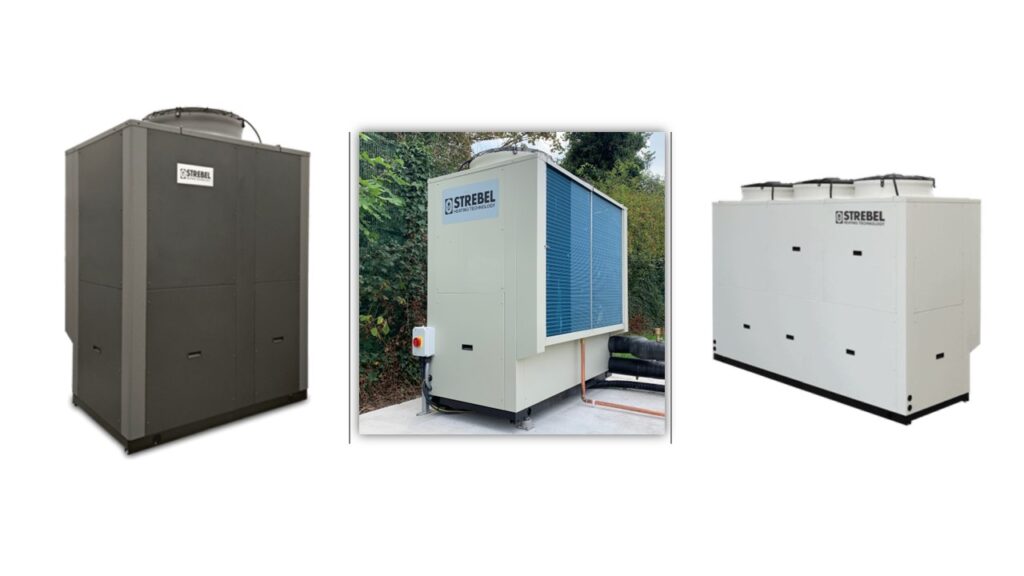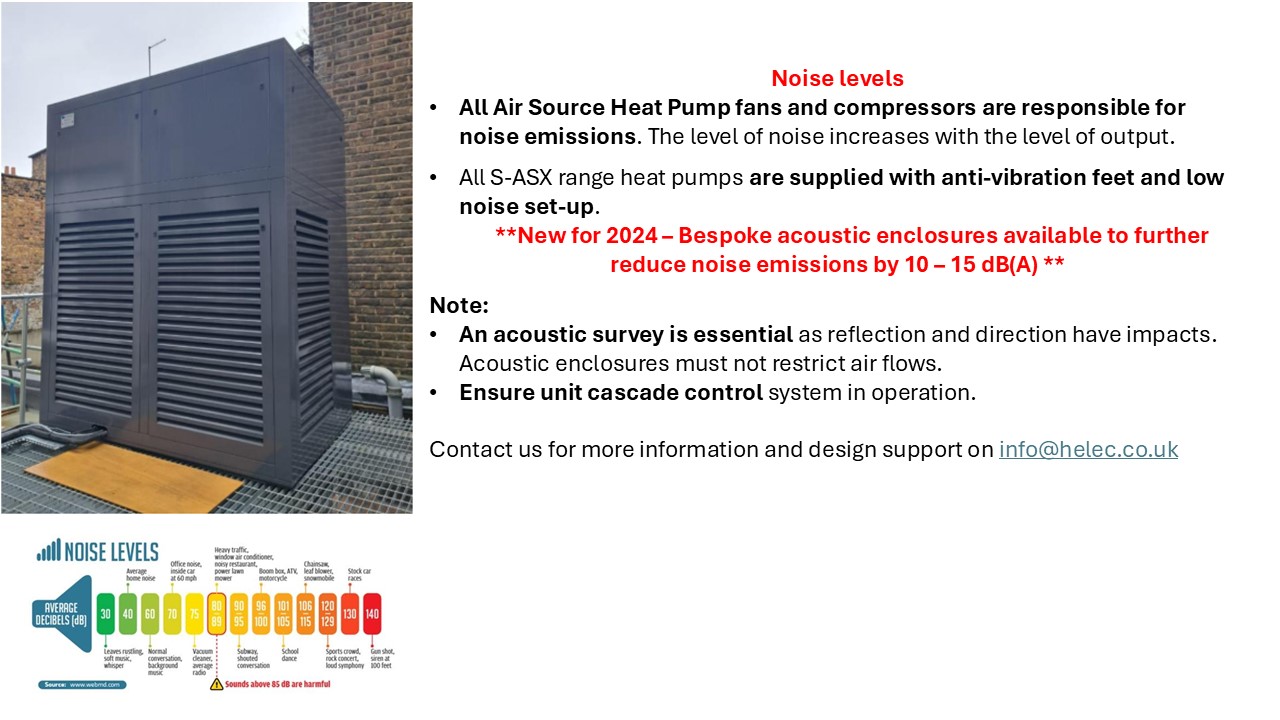Why Hospitals Are Using Air Source Heat Pumps
In this blog, we will share answers regarding the question of why hospitals are switching across to using air source heat pumps.
At Helec, we proudly offer multiple services to support building projects using renewable, sustainable, and low-carbon technologies. Our 17 years of experience provide us with the expertise to professionally handle the services of design and consultation, all the way to installation and performance monitoring.
What does an air source heat pump do?
An air source heat pump is a device that absorbs heat from the outside air and transfers it into your building to provide space heating and hot water.
It works a bit like a fridge, but in reverse. Instead of cooling the inside and releasing heat outside, it takes heat from the outside air and brings it inside. This heat is then used to warm up your building, or your domestic hot water.
Air source heat pumps are becoming increasingly popular as they are more energy-efficient than traditional gas boilers and crucially help to reduce carbon emissions. They can be a good option for large commercial buildings that have access to a good plentiful supply of outside air.
Does an air source heat pump reduce carbon?
Yes, air source heat pumps significantly reduce carbon emissions.
Unlike traditional gas boilers which burn fossil fuels & release carbon dioxide into the atmosphere, air source heat pumps simply draw in the outside air (heat) and compress it to deliver a higher temperature for use. This process simply uses electricity which means they don’t rely on burning fuels to generate heat.
While they do use electricity to operate, the carbon footprint of electricity generation is decreasing as renewable energy sources like wind and solar (PV) power become more prevalent as a grid sourced energy. So, overall, air source heat pumps contribute to a lower carbon footprint compared to natural gas fired boilers.
Why hospitals are using air source heat pumps

Hospitals are significant energy consumers, with the need for consistent, reliable heating and cooling crucial for patient care and staff wellbeing.
The traditional reliance on fossil fuels for these energy needs has led to substantial carbon emissions and escalating energy costs. Air source heat pumps (ASHPs) offer a compelling alternative that can deliver substantial benefits to healthcare facilities.
Environmental Benefits:
Reduced Carbon Footprint: A primary advantage of ASHPs is their significantly lower carbon emissions compared to traditional gas or oil boilers. By harnessing heat from the outside air, they contribute to reducing the healthcare sector’s carbon footprint, aligning with the NHS’s net-zero targets.
Improved Air Quality: While not a direct air purifier, ASHPs contribute indirectly to better indoor air quality. By reducing reliance on fossil fuels, they help to decrease emissions of harmful pollutants associated with combustion. This is particularly important in healthcare settings where patients, especially those with respiratory conditions, are vulnerable to poor air quality.
Economic Benefits:
Energy Cost Reduction: ASHPs are highly efficient, meaning they can extract more heat from the environment for less energy input. This translates to lower energy bills for hospitals, freeing up funds for patient care and other essential services.
- Government Incentives: The UK government offers various financial incentives to encourage the adoption of heat pumps. Hospitals can benefit from these schemes, offsetting the initial investment costs.
Long-Term Savings: ASHPs are known for their durability and require minimal maintenance. This should lead to long-term cost savings compared to traditional heating systems that often require frequent repairs and costly part replacements.
Operational Benefits:
Reliable Heat and Cooling: ASHPs provide a consistent and reliable source of heat and cooling, crucial for maintaining optimal conditions in hospital wards, operating theatres, and other critical areas.
- Flexibility: Modern ASHPs can operate in a wide range of weather conditions, ensuring a reliable heat source even during colder months.
- Space Saving: Compared to traditional boiler systems, ASHPs have a smaller footprint, freeing up valuable space within the hospital.
While the initial investment in an ASHP can be higher than a traditional boiler, the long-term savings and environmental benefits make it a compelling option for hospitals. Additionally, as technology advances and installation becomes more widespread, the cost of ASHPs is likely to decrease.
By embracing this technology, hospitals can play a vital role in reducing their carbon footprint, improving energy efficiency, and creating a healthier environment for patients and staff.
Challenges and considerations for air source heat pumps in hospitals
Technical Considerations:
Space Requirements: Hospitals often have limited outdoor space for installing the external unit of the ASHP. Careful planning is required to find suitable locations without impacting patient care or staff operations.
- Energy Demand: Hospitals have fluctuating energy demands, with peak periods requiring significant heating or cooling. ASHPs may need to be supplemented with other heating sources during extreme weather conditions.
Noise Pollution: The external unit of an ASHP can generate noise**. Hospitals must carefully consider the location of the unit to avoid disturbing patients and staff. **Helec is able to deliver low noise emitting heat pumps (see below)

Economic Factors:
Initial Investment: The upfront cost of installing an ASHP can be significant, requiring careful financial planning and potential investment from government or other funding sources.
Return on Investment: While ASHPs offer long-term cost savings, the payback period can vary depending on factors such as energy prices, the size of the hospital, and the efficiency of the system.
Operational Considerations:
Maintenance: Like any complex system, ASHPs require regular maintenance to ensure optimal performance. Hospitals need to allocate resources for maintenance and have trained staff to carry out routine checks.
Staff Training: To maximise the benefits of ASHPs, hospital staff need to be trained in their operation and maintenance. This includes understanding how to optimise the system for different weather conditions and identifying potential issues.
Regulatory and Policy Factors:
Building Regulations: Hospitals may need to comply with specific building regulations and energy efficiency standards when installing ASHPs.
Government Incentives: Understanding the available government incentives and grants can be complex, requiring expertise to navigate the application process and maximise financial benefits.
Air source heat pumps alternatives
There are alternatives to air source heat pumps. While air source heat pumps are a popular and efficient choice, they may not be suitable for every property or situation.
Here are some alternatives:
- Ground source heat pumps: These extract heat from the ground, often providing a more consistent heat source than air source heat pumps. However, they require groundworks and can be more expensive to install.
- Biomass boilers: These burn renewable fuels like wood pellets or woodchips to produce heat. While they can be efficient, they require a steady supply of fuel and may not be suitable for all properties.
- Electric heat pumps: These are becoming increasingly popular as an alternative to traditional electric heating systems. They can be more efficient than standard electric heaters, but may not be as cost-effective as air or ground source heat pumps.
- Insulation and energy efficiency: While not a direct heating source, improving your home’s insulation and energy efficiency can significantly reduce your heating needs.
It’s important to consider factors such as the type of property, location, budget, and environmental impact when choosing a heating system.
Explore the benefits of air source heat pumps today

We hope to have provided everything you need to know regarding as to why hospitals are using air source heat pumps. For more information on our financing options, feel free to click the link below for our contact information, so you can start your journey with us today.
The team here at Helec thanks you for taking the time to read our blog. If you have any further questions, you can contact us here. Alternatively, if you want to enquire about our expert services or for more information on our solutions, click here.
Our wide range of services enables us to provide consultation, installation, and maintenance if you require it.
Our expertise provides us the ability to offer the following energy solutions:
- Combined heat and power packages
- Complete CHP service and maintenance packages
- Thermal stores and buffer vessels
- Air & Ground source heat pumps
- Solar thermal hot water systems
- Large district residential heating systems
And more. See how Helec can help you today.

